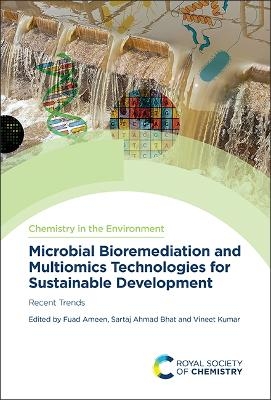
Microbial Bioremediation and Multiomics Technologies for Sustainable Development
Royal Society of Chemistry (Verlag)
978-1-83767-271-4 (ISBN)
The steadily increasing presence of both natural and anthropogenic pollutants in our environment poses a considerable challenge, given the recalcitrance of many of these pollutants. Microbial bioremediation presents a promising and sustainable strategy that harnesses a diverse array of microorganisms, operating either concurrently or sequentially, to eliminate or mitigate the presence of pollutants within the environment. Recent years have witnessed the application of multiomics techniques to the study of biodegradation and bioremediation, yielding an abundance of novel data that enrich our comprehension of pivotal pathways and offer fresh perspectives on the adaptability of organisms amidst shifting environmental conditions.
This book brings together recent progress in microbial bioremediation, emphasizing the emerging field of multiomics technologies. It serves as a valuable reference for microbiologists exploring multiomics applications and environmental scientists seeking innovative remediation solutions.
Dr. Fuad Ameen is an Associate Professor and researcher at the Department of Botany and Microbiology, College of Science, King Saud University, Riyadh, Saudi Arabia. He graduated his Ph.D. on biodegradation of urban waste by mangrove fungi from King Saud University, Saudi Arabia. After that, he has been involved in many kinds of projects dealing with new solutions to treat polluted sites. He has collected and studied microbial strains from arid and marine ecosystems, assessing their ability to biodegrade the most common pollutants, and his program of research on these organisms has taken him to many places and to examples of every major type of terrestrial and marine bioecosystem. Sartaj Ahmad Bhat is working as a JSPS Postdoctoral Researcher at the River Basin Research Center, Gifu University, Japan. He received his Ph.D. in Environmental Sciences from Guru Nanak Dev University, Amritsar, India in 2017. His primary research focuses on the development and evaluation of treatment technologies for organic waste and wastewater from domestic and industrial outlets as well as organic waste recycling, with a focus on the biological and sustainable treatment by earthworms. Vineet Kumar is working as a National Postdoctoral Fellow in the Department of Microbiology, School of Life Sciences at Central University of Rajasthan, Rajasthan, India. He received his Ph.D. in Environmental Microbiology from Babasaheb Bhimrao Ambedkar (A Central) University, Lucknow, India in 2018. Dr. Kumar’s research areas include bioremediation, phytoremediation, metagenomics, wastewater treatment, environmental monitoring, biofuel, and bioplastic production, and solid waste management with major focuses on the development of integrated and sustainable treatment techniques that can help in minimizing or eliminating hazardous waste or wastewater pollutants in the environment.
Microbial-mediated Pesticide Bioremediation: An Approach Through the OMIC Technologies;Bioremediation of Microplastics by Microorganisms: Trends, Challenges, and Perspectives;Microbial Bioremediation of Petroleum Contamination in the Niger Delta: Assessing the Role of Indigenous Microbial Communities and Potential for Sustainable Restoration;Earthworms and Their Associated Microorganisms in Recycling of Organic Wastes for Sustainable Development;Bioremediation of Petroleum Contamination by Microorganisms: Role of Microbial Communities and Applications;Microalgal Systems: Exploring the Symbiotic Synergies Through Organic Wastewater Bioremediation for Environmental Stewardship;Bioremediation of Pesticides by Microorganisms: The State of the Art, Success Stories, Challenges, and Future Outlook;Heavy Metal Remediation by Microorganisms in the Total Environment: Effects of Processing Conditions and Recent Advances;Microbial Assisted Phytoremediation of Contaminated Soils: An Effective Way to Enhance Bioremediation of Contaminated Areas;Floating Treatment Wetlands (FTW) for Sustainable Industrial Wastewater Treatment;Microbial Fuel Cells: Transitioning Towards an Industrial Level Bioremediation;Nanobioremediation: A Promising Approach for Sustainable Development;Biochar and Other Biosorbents for the Bioremediation of Contaminated Water: Advances and Applications;Proteomics Monitoring of Microbes During Biodegradation of Environmental Contaminants;Gene Editing and Systems Biology Tools for Agrochemical Bioremediation: Trends and Future Perspectives;Nano-bioremediation and Multi-omics: Pioneering Sustainable Strategies for Environmental Remediation;Metabolomics: An Approach to Decode the Insight of Organism Functioning in Polluted Environments;Metagenomics Insight Into Microbial Community Analysis During Pesticides Degradation: State of the Art, Success Stories, Challenges, and Future Outlook
| Erscheinungsdatum | 03.10.2024 |
|---|---|
| Reihe/Serie | Chemistry in the Environment ; Volume 13 |
| Verlagsort | Cambridge |
| Sprache | englisch |
| Maße | 156 x 234 mm |
| Gewicht | 1015 g |
| Themenwelt | Naturwissenschaften ► Biologie ► Mikrobiologie / Immunologie |
| Naturwissenschaften ► Biologie ► Ökologie / Naturschutz | |
| Naturwissenschaften ► Chemie | |
| Technik ► Umwelttechnik / Biotechnologie | |
| ISBN-10 | 1-83767-271-7 / 1837672717 |
| ISBN-13 | 978-1-83767-271-4 / 9781837672714 |
| Zustand | Neuware |
| Informationen gemäß Produktsicherheitsverordnung (GPSR) | |
| Haben Sie eine Frage zum Produkt? |
aus dem Bereich


